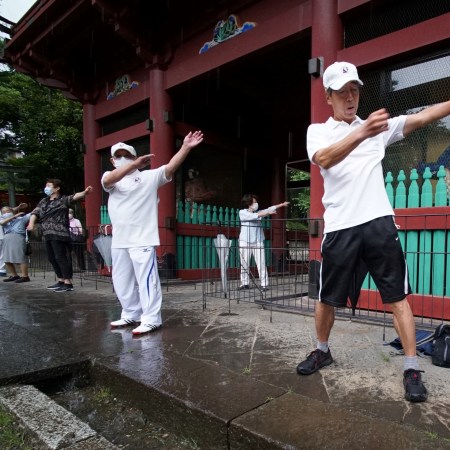As you might’ve noticed, Bong Joon Ho’s been making the press rounds for the new science fiction film Mickey 17, his first release since winning four Oscars for Parasite back in 2019. Among some of the great promotional content out there — like Ho forcing Robert Pattinson to eat spicy noodles at a Seoul hole-in-the-wall — was the South Korean director’s interview with The New York Times Magazine. He talks a lot about his creative process and the making of the film (which I caught last Sunday and definitely recommend), but one moment stood out in particular, when he and features writer Jonah Weiner sit down for cold lagers and grilled dishes in a restaurant Ho affectionately describes as “a dirty, stinky…friendly drinking and food place.”
Ho’s films typically function as class allegories. And as the pair get into their meal, their conversation naturally drifts into a rumination of postwar South Korea, late capitalism and employee burnout. Ho invokes a concept called sohwakhaeng.
“There are some young people saying, ‘I reject this, I hate all this, I’m not joining this craze of competition,’” he told Weiner. “And their lifestyle is different. They are not hippies, but they organize a calm and small life.” As they tuck into their sizzling meal and Weiner points the table’s cheap electric fan in Ho’s direction, Ho brands the gesture as an immediate example of what he’s talking about. “This is a small happiness,” he says. “Clear and evident.”
The Sport of Spacing Out
Ready, set, relax: in Asian countries, thousands of burnt-out adults now gather for competitions to do as little as possibleThe Origin of Sohwakhaeng
The philosophy translates to a “small but certain happiness,” and its origin intersects with another famous creative: Haruki Murakami. In his 1986 essay collection, “Afternoon in the Islets of Langerhans” (which is yet to be translated into English), the Japanese novelist described a variety of such tiny joys, including eating fresh bread with ones hands and seeing folded underwear in a drawer. Years after that essay was published, the Japanese word shōkakkō was embraced in Korean, as sohwakhaeng. It was pronounced differently, but spelled exactly the same — each culture’s writing system borrows characters from Chinese.
Why Did It Take Off in South Korea?
This perspective probably sounds familiar to Americans, as a foreign riff on “enjoy the little things.” But sohwakhaeng made a huge leap in South Korea from mindful aphorism to cultural movement; posts tagged with the word have amassed hundreds of thousands of impressions on social media.
The Korea Herald postulated that its popularity is a reaction to South Korea’s infamous “pali pali” culture. The expression roughly translates to “hurry hurry” and refers to the nation’s obsession with quick and constant results. Seoul, home to more than nine million people, routinely ranks as one of the most stressed-out populations in the world.
A writer on assignment for The New Yorker recently went to Seoul (to investigate its population implosion), and this section stuck with me: “Ho-gil recently saw a report that Korea was the only wealthy industrialized nation where the highest personal priority was economic improvement rather than love. He told me, ‘In Korean society, we are educated to have one single goal, but then, once you’re grown up, you don’t know what to do with your freedom — you get lost in the world, and you don’t know how to have a good life.’”
It’s telling that young South Koreans, in particular, have embraced sohwakhaeng. The practice represents an antidote to burnout, a small-scale revolt of a system they didn’t ask for.
How to Apply It to Your Life
Unsurprisingly, there’s been some online blowback to the sohwakhaeng movement. Some culture critics noticed that over time, South Koreans felt a need to prove they were abreast of the trend and started strategically curating a social media strategy in service of sohwakhaeng. There are obvious Western parallels: an Instagram story showing an espresso and a book, for instance.
Either Ho is unaware of such “happiness fatigue,” or his remarks to the Times are a little dated. (As Mickey 17 ‘s release was delayed on account of the 2023 Writers Guild of America strike, the latter is likely.) According to The Korea Times, South Koreans became sick of A) the perceived need to either capture the day’s small joy, and B) the bastardization of the concept. Before long, some South Koreans were trying to pass off omakase dinners in Tokyo as sohwakhaeng.
That’s all pretty depressing. But it shouldn’t rob the concept of its core value. And it’s still relevant that it found such a amenable appetite in South Korea to begin with, as Ho noted.
Every word of “small but certain happiness” matters. But certain is the key underrated one. These things are specific: They hit you when they hit you, you know when you know. You just have to open yourself to them. Notice that Murakami’s original examples are sort of off-kilter. Another one of his examples was the rustling sound a cat makes when it jumps onto a bed.
Small joys often aren’t easily captured or consumable. They’re often smells, feelings, flickers. They’re personal to you, they’re something experienced and, good news, if you look up and around, they are practically everywhere.
The Charge will help you move better, think clearer and stay in the game longer. Subscribe to our wellness newsletter today.




















